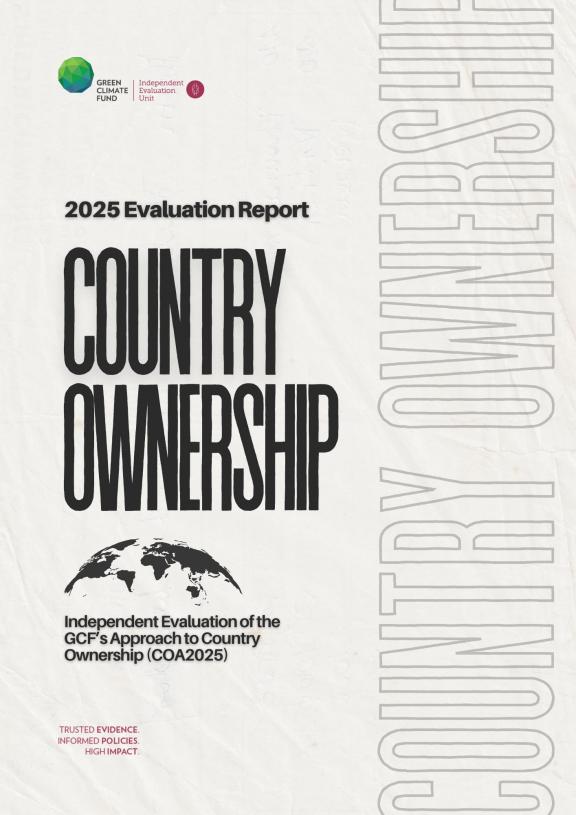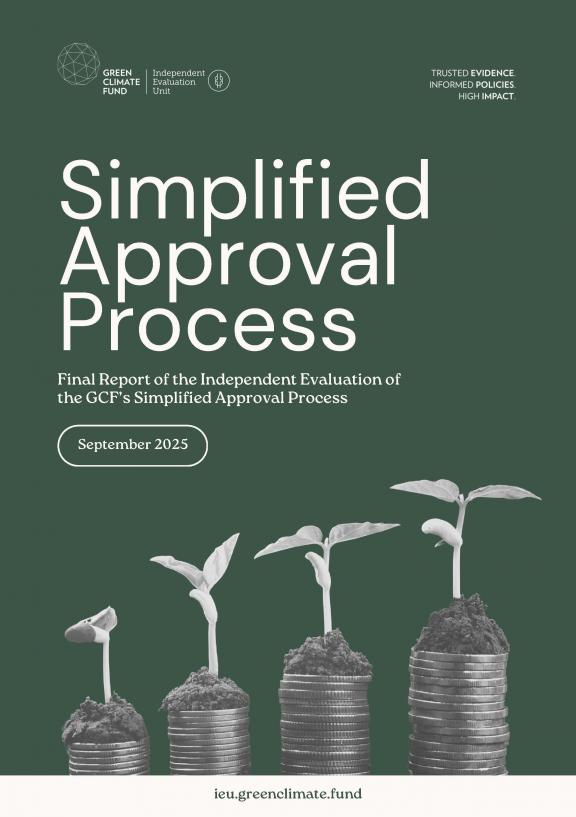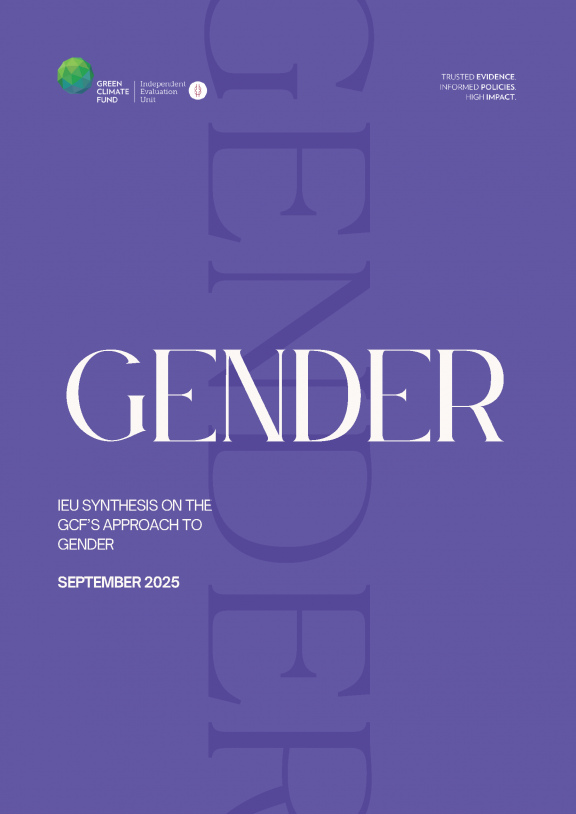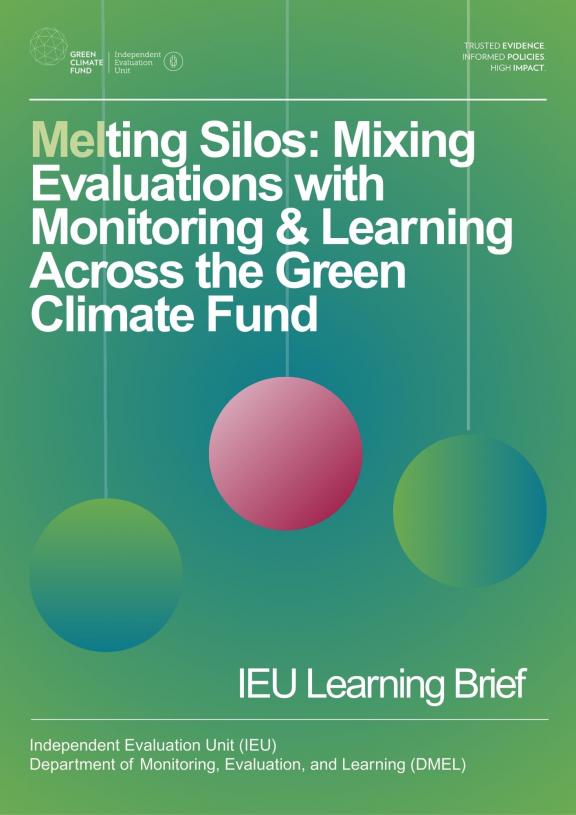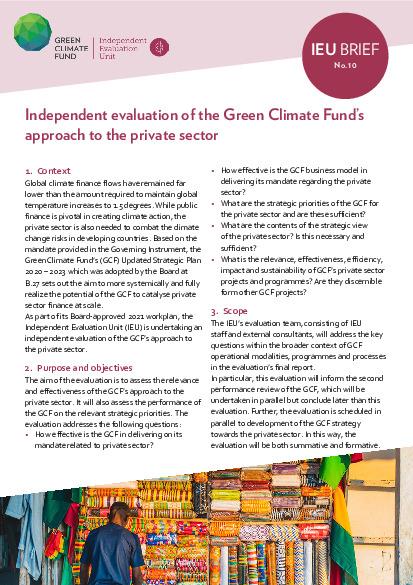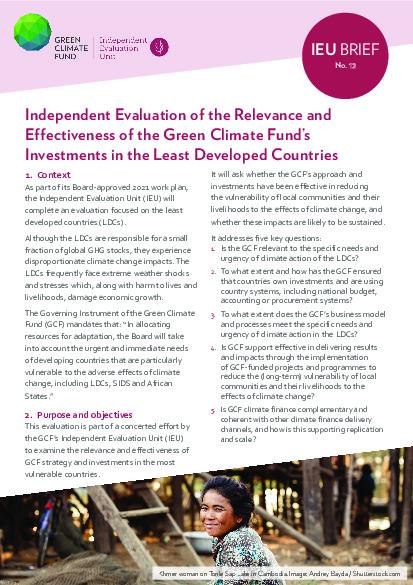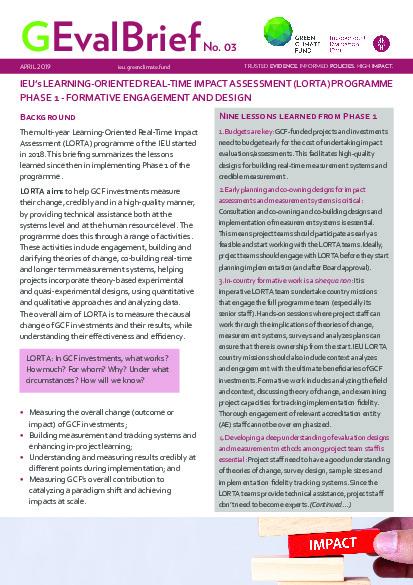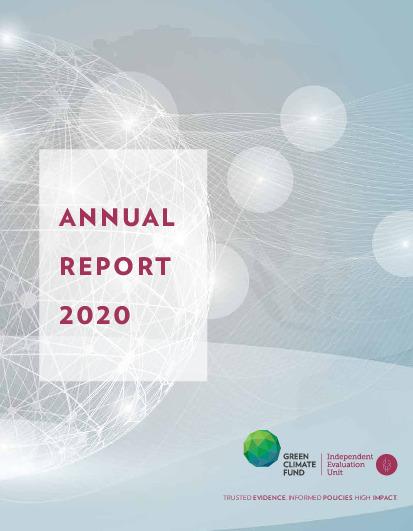IEU publications
IEU publications
To serve the needs of our stakeholders, the IEU issues a variety of publications related to our work, including in the context of evaluations and learning. Keep up with the IEU’s latest publications here.
Featured publications
Independent Evaluation of the GCF's Approach to Country Ownership (COA2025)
This independent evaluation of the Green Climate Fund’s (GCF) approach to country ownership was approved by the GCF Board as part of the 2025 workplan of the Independent Evaluation Unit (IEU) and is submitted in time for its forty-third meeting (B
Independent Evaluation of the GCF’s Simplified Approval Process (SAP2025)
The Green Climate Fund’s Simplified Approval Process (SAP) was created to make climate finance more accessible and responsive, thus enabling smaller, lower-risk projects to address urgent climate needs in vulnerable countries.
Independent Synthesis of the GCF’s Gender Approach
Approved at the fortieth meeting of the GCF Board (B.40), this formative Gender Synthesis consolidates insights from past evaluations, assessments, and studies to inform the forthcoming Independent Evaluation of the GCF’s Gender Approach.
MELting Silos: Mixing Evaluations with Monitoring & Learning Across the Green Climate Fund
This IEU Learning Brief, prepared jointly by the Independent Evaluation Unit (IEU) and the Department of Monitoring, Evaluation, and Learning (DMEL), examines how the Green Climate Fund (GCF) can better align its monitoring, evaluation, and learni
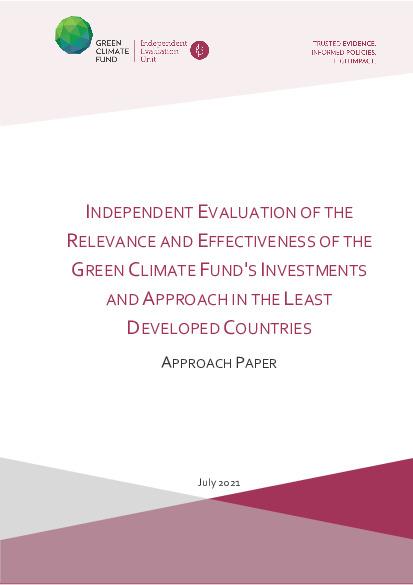
Approach Paper for the Independent evaluation of the effectiveness of the GCF's investments in the LDCs
July 2021
Overall, the evaluation endeavours to understand how and to what extent the GCF’s approach, mechanisms and financial modalities respond to the unique conditions facing the LDCs. The evaluation will assess the GCF’s investments in concrete terms and will aim to assess the impact, or projected impact of the GCF’s projects in the LDCs. The evaluation will be guided by the evaluation criteria for the IEU, which form the foundation of our core evaluation questions and associated subsidiary questions...
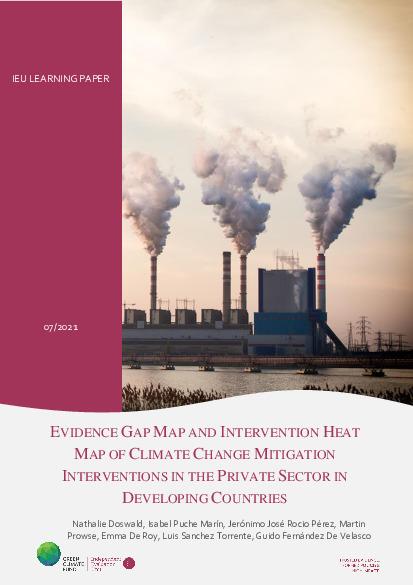
Evidence gap map and intervention heat map: Climate change mitigation interventions in the private sector in developing countries
July 2021
This evidence review describes the evidence base on private sector investment in mitigation and describes the modes of funding for mitigating greenhouse gas emissions.
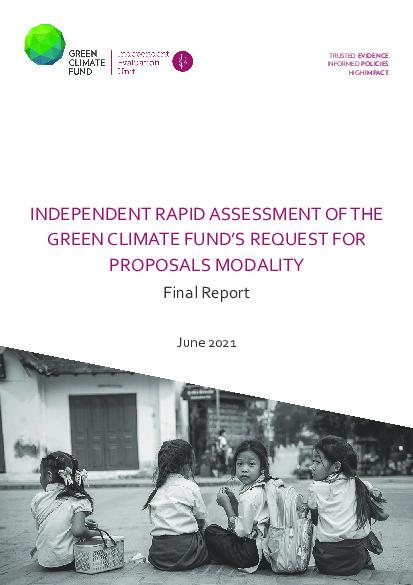
Final report on the Rapid assessment of the Green Climate Fund’s Request for Proposals Modality
June 2021
A request for proposal (RFP) is a business document that announces a project, describes it and solicits bids or responses from qualified entities to complete it. This report presents the IEU’s rapid assessment of GCF’s request for proposal (RFP) modality. The final report addresses the following: A description of the RFP The RFP’s relevance to GCF’s strategy and country needs The efficiency and effectiveness in implementing the RFP The value added of the RFP as a modality regarding...
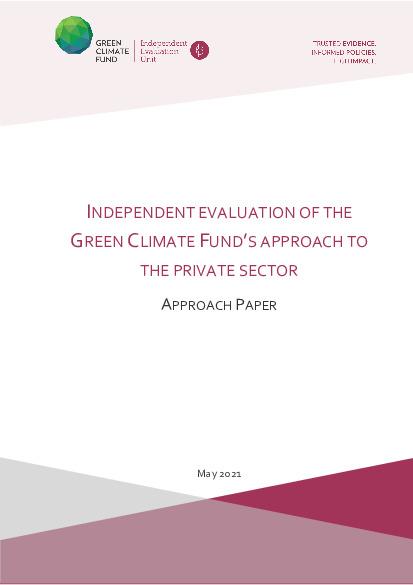
Approach Paper for the Independent Evaluation of the GCF’s Approach To The Private Sector
June 2021
Following the overall mandate provided to this evaluation and its context, the evaluation will assess the relevance and effectiveness of the GCF approach to the private sector and will assess the performance of the GCF on the USP.
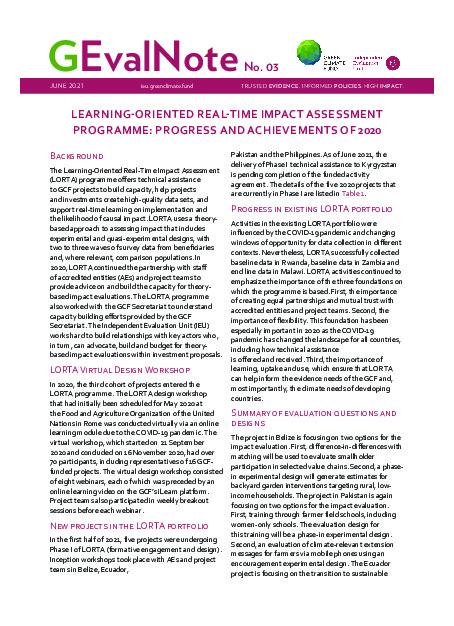
GEvalNote 03: LORTA 2020
June 2021
The multi-year Learning-Oriented Real-Time Impact Assessment (LORTA) programme keeps track of the impact of GCF investments. Its goal is to assist GCF projects measure their impact in lowering greenhouse gas emissions and enhancing resilience to climate change, and if so, by how much. LORTA’s assistance includes, among other things, building and clarifying theories of change, co-building real-time and longer term measurement systems and helping projects use quantitative and qualitative...
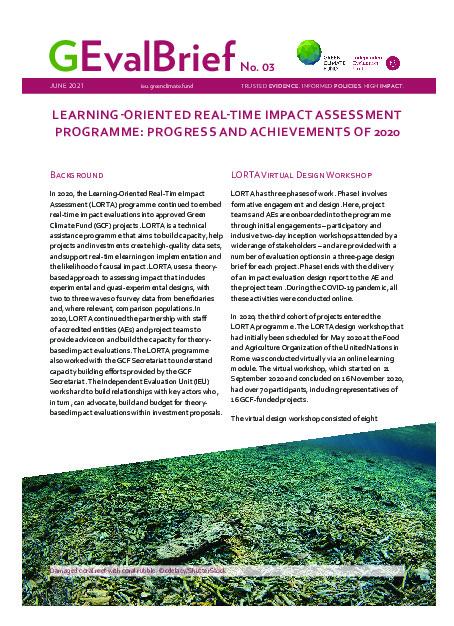
GEvalBrief 03: LORTA 2020
June 2021
The multi-year Learning-Oriented Real-Time Impact Assessment (LORTA) programme keeps track of the impact of GCF investments. Its goal is to assist GCF projects measure their impact in lowering greenhouse gas emissions and enhancing resilience to climate change, and if so, by how much. LORTA’s assistance includes, among other things, building and clarifying theories of change, co-building real-time and longer term measurement systems and helping projects use quantitative and qualitative...
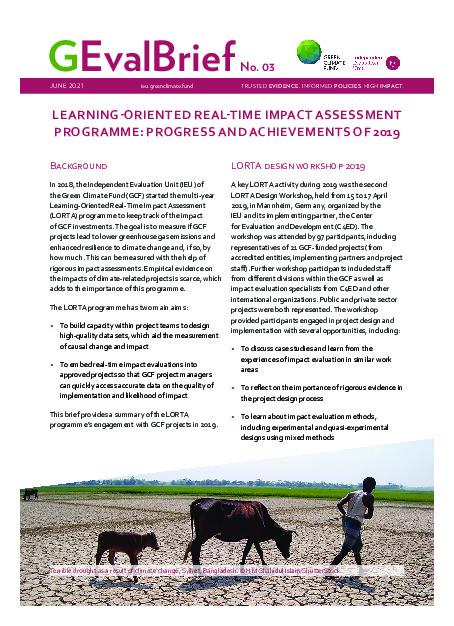
GEvalBrief 03: LORTA 2019
June 2021
The multi-year Learning-Oriented Real-Time Impact Assessment (LORTA) programme keeps track of the impact of GCF investments. Its goal is to assist GCF projects measure their impact in lowering greenhouse gas emissions and enhancing resilience to climate change, and if so, by how much. LORTA’s assistance includes, among other things, building and clarifying theories of change, co-building real-time and longer term measurement systems and helping projects use quantitative and qualitative...
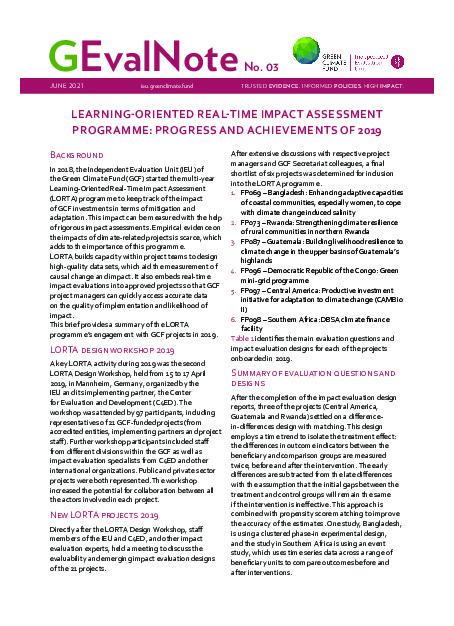
GEvalNote 03: LORTA 2019
June 2021
The multi-year Learning-Oriented Real-Time Impact Assessment (LORTA) programme keeps track of the impact of GCF investments. Its goal is to assist GCF projects measure their impact in lowering greenhouse gas emissions and enhancing resilience to climate change, and if so, by how much. LORTA’s assistance includes, among other things, building and clarifying theories of change, co-building real-time and longer term measurement systems and helping projects use quantitative and qualitative...
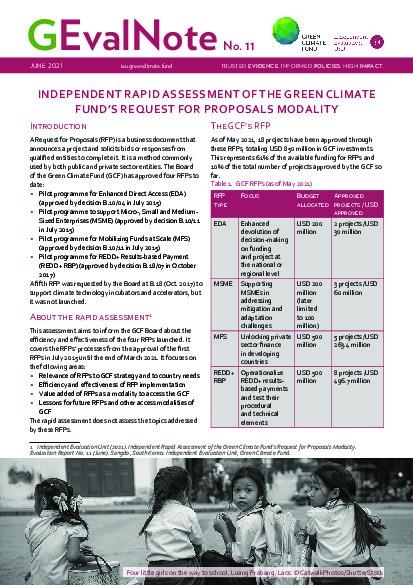
GEvalNote 11
June 2021
A request for proposal (RFP) is a business document that announces a project, describes it and solicits bids or responses from qualified entities to complete it. Assistance includes, among other things, building and clarifying theories of change, co-building real-time and longer term measurement systems and helping projects use quantitative and qualitative approaches to analysing data. This 2-page brief provides decision makers with an overview of the key points in the IEU’s independent rapid...
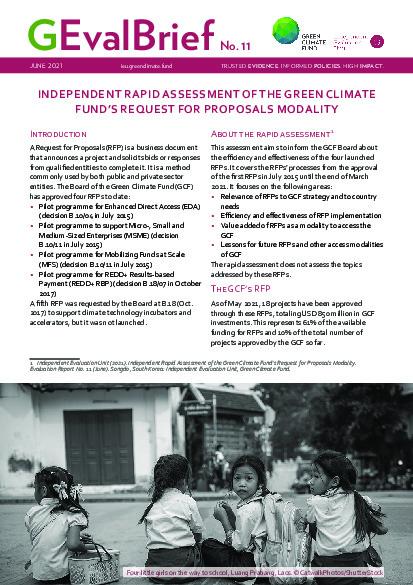
GEvalBrief 11
June 2021
A request for proposal (RFP) is a business document that announces a project, describes it and solicits bids or responses from qualified entities to complete it. Assistance includes, among other things, building and clarifying theories of change, co-building real-time and longer term measurement systems and helping projects use quantitative and qualitative approaches to analysing data. This 4-page summary provides a quick, reader-friendly overview of the key points in the IEU’s independent...
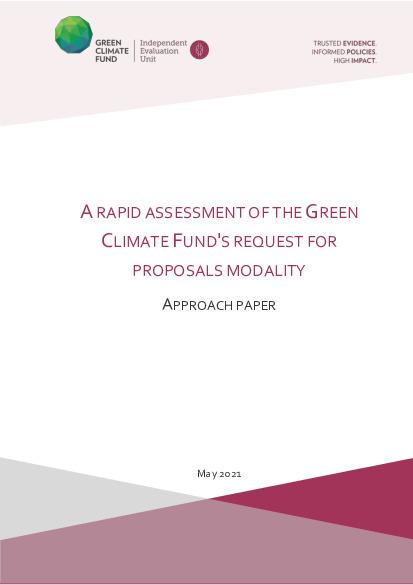
Approach Paper for the Rapid Assessment of the GCF's Request For Proposals Modality
May 2021
The objective of this assessment is to examine, primarily, the relevance of the RFP modality to the mandate of the GCF, to look at its effectiveness, and to inspect the implementation process of the modality. It will look at past RFPs to draw lessons from their implementation and find recommendations for the modality’s improvement. The assessment will not, however, focus on recommending topics for future RFPs.
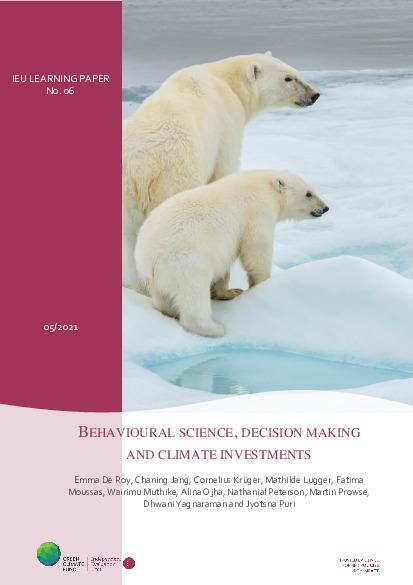
Behavioural science, decision making and climate investments
May 2021
This paper builds a bridge between how climate interventions are conceived and implemented and the nascent field of behavioural science as a practical, low-cost but potentially rewarding route for increasing the effectiveness of climate interventions.
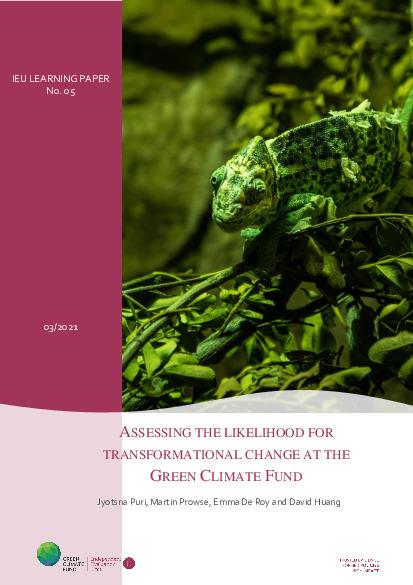
Assessing the likelihood for transformational change at the Green Climate Fund
March 2021
This paper reviews the project documents of GCF investments through March 2020. It uses bivariate statistics and multivariate cluster analysis to examine whether mitigation, cross-cutting or adaptation thematic areas show the greatest likelihood of contributing to transformational change.
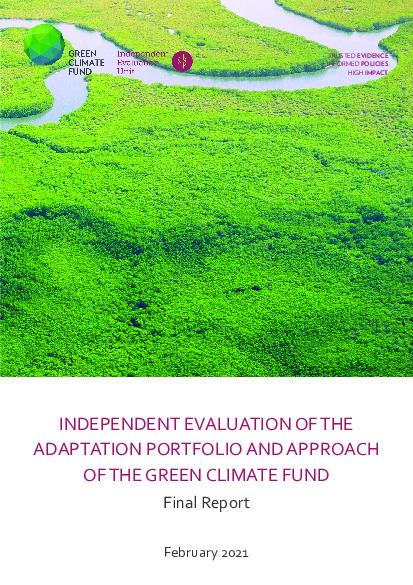
Final report on the Independent evaluation of the adaptation portfolio and approach of the Green Climate Fund
February 2021
In climate change science, adaptation means preparing for and adjusting to climate change's current and future effects. This evaluation of the GCF’s adaptation portfolio and approach assesses what it takes for the GCF to contribute to adaptation interventions with greater scale, depth and duration in developing countries. It highlights how the GCF can facilitate scaling and growth through its unique ability to finance projects at scale. The evaluation shows how the GCF: Can apply its convening...
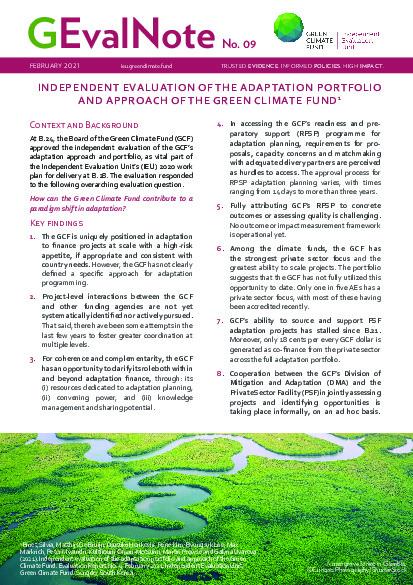
GEvalNote 09
February 2021
In climate change science, adaptation means preparing for and adjusting to climate change's current and future effects. This 2021 2-page note introduces decision makers to the key points in the IEU’s evaluation of the GCF’s adaptation approach and portfolio. It describes in easily understood terms the evaluation’s context, purpose, scope, methods, country engagement and output and timing..
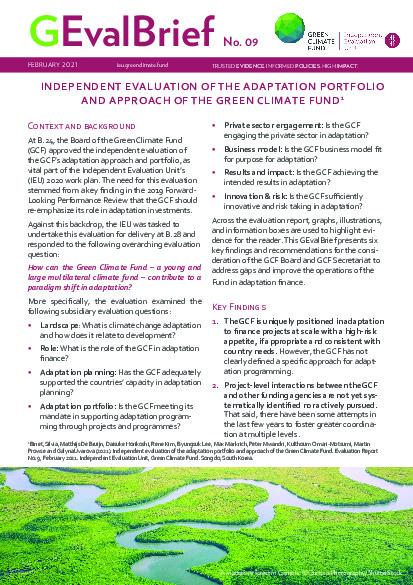
GEvalBrief 09
February 2021
In climate change science, adaptation means preparing for and adjusting to climate change's current and future effects. This 2021 4-page brief introduces decision makers to the key points in the IEU’s evaluation of the GCF’s adaptation approach and portfolio. It describes in easily understood terms the evaluation’s context, background, findings, recommendations and methods.
